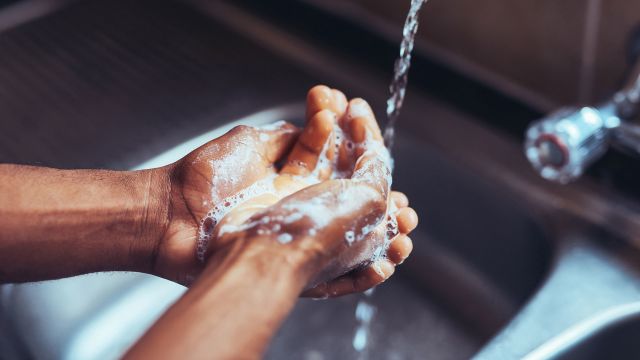Updated on November 28, 2023.
Washing your hands is one of the most effective ways to avoid colds, the flu, COVID, and other infections—and to prevent spreading illness to others around you.
But when, how, and why should you wash your hands? These details are as important as the act itself. Here are the dos and don’ts of proper handwashing.
Do understand the need to wash
Touching our eyes, noses, and mouths with dirty hands is one way germs gain access to our bodies and make us sick. Germs on our hands can also be transferred to our food and drink, as well as objects such as tables, chairs, remote controls, and toys, where they can infect others. In fact, a March 2020 study in The New England Journal of Medicine found that the coronavirus that causes COVID lasts up to two to three days on plastic and stainless steel.
Washing your hands with soap helps you steer clear of these germs and stave off infections.
Do know that handwashing works
Data shows handwashing can effectively prevent many illnesses. For example, it reduces respiratory illnesses in the general population by as much as 21 percent, according to the Centers for Disease Control and Prevention (CDC) and reduces the number of people who get sick with diarrhea by up to 40 percent.
Chemicals in the soap can break down viruses’ outer layer of fat, rendering them harmless to you.
Do wash your hands often
It’s important to wash your hands after coughing, sneezing, or blowing your nose—as well as before and after caring for a sick person. You should also clean them after you’ve been in a public area, such as a grocery store or pharmacy.
To prevent illnesses, other times that call for handwashing include:
- Before, during, and after preparing food, and before eating
- Before and after attending to a wound
- After using the toilet
- After changing a diaper or cleaning up after a child who has gone to the bathroom
- After touching an animal, animal food, or animal waste
- After handling pet food or pet treats
- After touching garbage
Don't worry about water temperature
The CDC says that any temperature water will do for handwashing, since it doesn’t seem to matter in terms of germ removal. In fact, using hot water may be more drying to the skin.
To get started, wet your hands with clean, running water. Then turn off the tap and apply your soap. Doing so saves water and doesn’t necessarily increase the risk of germs being transferred from your hands to the faucet, or vice versa, says the CDC.
Do use soap
Soap contains special chemicals that break down germs. What’s more, water alone isn’t as effective for removing microbes. It’s the friction created by rubbing your hands together with the soap that really lifts dirt, grease, and germs from your hands.
As for the type of soap, it can be plain, old-fashioned bar or liquid soap. Antibacterial soap does not enhance the effectiveness of handwashing.
Do scrub for at least 20 seconds
Research shows that washing your hands for about 15 to 30 seconds removes more germs than washing them for shorter periods of time. The CDC and other health organizations recommend a minimum of 20 seconds.
To make sure you hit the 20-second mark, count to 20 as you’re washing or sing “Happy Birthday” twice. Other songs can also fit the bill. Depending on your taste, you can belt out the choruses of “Africa” by Toto, "Shake It Off” by Taylor Swift, or “Sweet Caroline” by Neil Diamond.
Don't forget to scrub between fingers and under nails
Germs lurk on every part of your hand, particularly in the crevices under your nails. So, scrub your palms, fingers, and fingertips, and take special care to wash and scrub in between your fingers and beneath your nails. Make sure you get your wrists and the back of your hands, too.
Do rinse under clean, running water
Thoroughly rinsing soap from your hands under a tap will minimize skin irritation caused by soap residue. It can also reduce the odds of your hands becoming re-contaminated, which may happen if you rinse in previously contaminated still water.
Do dry your hands
Germs are transferred more easily to and from wet hands. There’s no one-size-fits-all recommendation for drying your hands. Air drying or using a clean hand towel will do the trick equally well.
Do moisturize your hands
Constant handwashing can lead to dry, cracked skin. To prevent this, while your hands are still damp, moisturize with fragrance- and dye-free ointment or creams that contain mineral oil or petrolatum. Don’t forget fingertips. Use petroleum jelly on your hands before bed if they are severely dry.
Do know when it’s okay to use hand sanitizer
Hand sanitizers are recommended if you don’t have access to soap and water. Always choose a product that contains at least 60 percent alcohol and don’t skimp on the amount you pump. Rub the sanitizer on both sides of your hands and in between your fingers and on your fingertips for 20 seconds or until your hands are dry.
Do make sure your kids know the drill
Remind them frequently about how and when they should be washing their hands. Most of all, make sure you’re setting a good example—it’s a life skill that will come in handy for years to come.




